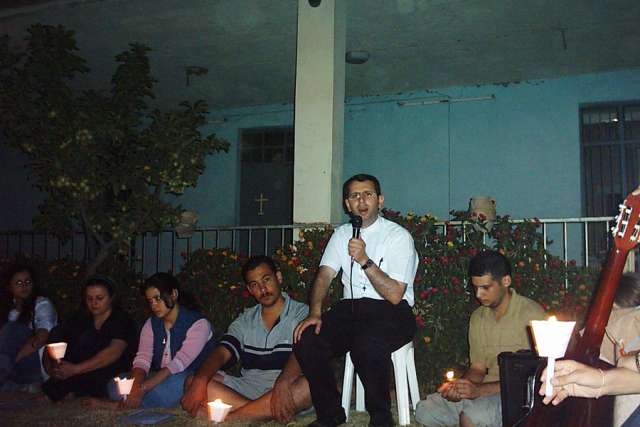Priest and his three companions were killed for the faith in Iraq
Priest and his three companions were killed for the faith in Iraq
Jun 16, 2017

By Hannah Brockhaus
When Fr. Ragheed Aziz Ganni was confronted by armed men after celebrating the Eucharist at his Chaldean Catholic parish in Mosul, they asked him why he was still there and why he hadn't closed the church as they had demanded.
"How can I close the house of God?" he responded, right before they shot and killed him, alongside three friends and subdeacons at the parish: Waheed, Ghasan, and Basman.
An Iraqi priest born in 1972 in a town in the Plain of Ninevah, Fr. Ganni moved to Rome in 1996 to study at the Pontifical University of Saint Thomas Aquinas on a scholarship from the pontifical foundation Aid to the Church in Need.
In 2003 he decided to return to Iraq, despite the war following the American invasion, and the persecution of Christians that was taking place. He served at a parish in Mosul until the day of his death, June 3, 2007.
Ten years after his death, Fr. Ganni's friend and fellow priest, Fr. Rebwar Basa, has written a book about his life and death, and about the ongoing situation of Christians in Iraq. He spoke to CNA at a presentation for A Catholic Priest in the Islamic State, published by Aid to the Church in Need.
The martyrdom and testimony of Fr. Ganni, he said, “is very important for the whole Church, but especially in Iraq.”
“He is an example for all of us to resist and to testify to the Gospel in the midst of the conflict and violence that we have in Iraq. Because we need this kind of witness to reconstruct Iraq, to be able to live together in peace and unity.”
Baian Adam Balla, the wife of Waheed Hanna Isho’a, one of those killed with Fr. Ganni, was an eyewitness to the events of the martyrdom, though her life was spared. In an interview published in the book, she described how they were attacked.
The day of the murder, Fr. Ganni was accompanied by three subdeacons of the parish, Waheed, Ghasan and Basman, as well as Waheed’s wife, Baian.
Driving home after saying Sunday evening Eucharist at Holy Spirit church in Mosul, they were approached by masked men carrying machine guns and told to get out of the car and put their hands up in the air.
“And then they fired and took the car. And I began to cry out. There was a butcher, I do not know, a butcher man. He was a Muslim. They took the car and kidnapped him. But at us Christians … they shot and they killed them,” Baian recounted.
“Certainly there is an effect. Not an effect on our faith, but an effect on us, because we are not able to go in the church … because we are not able to continue so … How are we able to continue like this? In these conditions? But what do they want from us? What have we done?”
There had been around 10 different attacks on the church before this, though with no casualties. But Fr. Ganni seemed to know that something worse might happen.
The morning of his death, after meeting with some young men for breakfast and renewing his ID, he visited his father and mother, bringing with him a recent photograph of himself, which he gave them.
In an interview recorded in Fr. Basa’s book, Fr. Ganni's father recalled him saying to his mother that the photograph “is for my funeral, so it is not a worry to you.”
His mother remembered that he said to her, "Mamma, if I die now or I die in 10 years, there is always a death. If they cut my throat with a knife, at the beginning it will hurt badly, but then I will feel nothing more."
She said to him, "So they have threatened you!" and he answered: "I know that they have threatened the whole Church, but have they threatened me personally?" He was laughing but he didn't answer the question, she related.--CNA







Total Comments:0